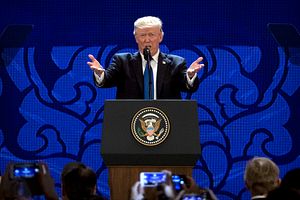This week, the United States announced new sanctions targeting Myanmar’s top military leadership. While such measures have been long-mulled and are only one part of Washington’s approach toward Naypyidaw, the development nonetheless spotlighted the broader question of how U.S.-Myanmar relations are faring under U.S. President Donald Trump and how they may shape up in the future as well.
As I have observed before in these pages, the United States initially moved to normalize ties with Myanmar under former U.S. President Barack Obama in the wake of reforms that had begun to take shape in the Southeast Asian country. However, recent developments, in particular the Rohingya crisis and documented human rights violations and abuses involving the Myanmar military, have since led Washington to gradually begin recalibrating its approach. This has come amid a series of broader issues as well, including fears of Myanmar tilting toward China and lingering concerns about the U.S. approach to democracy and human rights under Trump.
This week, the administration’s approach to Myanmar drew headlines with the imposition of new sanctions on Myanmar military leaders. The sanctions, officially announced on Tuesday, targeted Min Aung Hlaing, the commander-in-chief of the Tatmadaw, the deputy commander-in-chief, Soe Win, and two other senior officials: Brigadier General Than Oo and Aung Aung.
The sanctions constitute a calibrated U.S. policy response to ongoing developments rather than a profound and unexpected shift. From Washington’s perspective, Naypyidaw has not been taking the necessary actions to hold those leaders accountable for previous human rights violations, while reports of new abuses have continued to surface. Given this, imposing targeted sanctions on certain specific senior military leaders, rather than wider restrictions that have been called for but have not surfaced thus far, constitutes a modest way for the United States to shift its policy to recognized this longstanding reality.
Nonetheless, the move is not without significance for U.S. Myanmar policy, for the broader international response to the Rohingya crisis, and for democracy and rights more generally. In terms of U.S. policy, it represents one part of Washington’s broader balancing act to preserve some engagement while also intensifying efforts to change Naypyidaw’s behavior and promote accountability in Myanmar.
Beyond this, it also shapes a broader international conversation about how other countries should walk this balance, with others having restrictions in place of various kinds as well, including the European Union. It was no coincidence, for instance, that U.S. Secretary of State Michael Pompeo, in his statement on the sanctions, went out of his way to characterize this modest step as nonetheless the first publicized government action against the most senior military leadership of Myanmar, reinforcing Washington’s broader global role.
The move is also significant in terms of a broader conversation about democracy and human rights in the region. This link was reinforced by the timing of the Myanmar announcement alongside the holding of a international conference of government ministers on religious freedom – which the Trump administration has been signaling as being among its contributions to promoting democracy and human rights in spite of concerns that persist on this front. Apart from the official conference proceedings, the conference has also seen a series of other events, including a White House meeting between Trump and victims of religious prosecution that featured Rohingya as well.
Of course, amid all the headlines that focus on U.S. Myanmar policy, it is important to acknowledge that Washington’s role is only one part of a series of variables that will play into how developments unfold in Myanmar itself. In that respect, while U.S. actions will be important to monitor, they will need to be considered alongside other trends and events as well, including Naypyidaw’s alignments with major powers such as China and Japan as well as domestic politics in Myanmar leading up to presidential elections expected next year.
Nonetheless, Washington’s action this week bears significance within that bigger picture. Though the United States has continued to shy away from tougher actions suggested by other advocates, such as wider sanctions or labeling the actions by the Myanmar government as “genocide” (as opposed to “ethnic cleansing”) the Trump administration has nonetheless illustrated that it is willing to take some measures to respond to developments on the ground. Whether or not it will lead to any change in Myanmar’s behavior, and how it will affect the broader trajectory of U.S.-Myanmar ties in the future, remains to be seen.

































